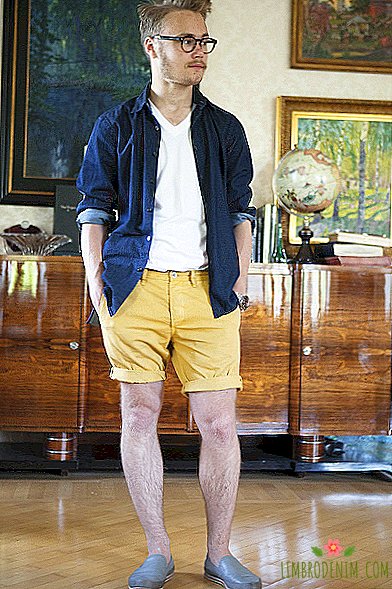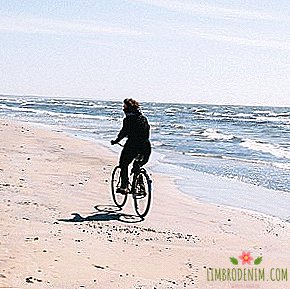How to exchange life in the capital for a village by the sea and not regret
Text: Olga Shakina
Caption: a year ago. Knocking on the corners of the nano-studio at Net, I'm going to work. Three stops in a lightweight hang, an icy bridge run, at one end of which the patriarch is broadcasting from two screens in the infernal desynchronization, and at the other end the Strelka bar feeds the urbanists. “I was late,” the producer of the ether greets me. “And we also have to come up with a poll of the day. I offer you a choice: gays, Cossacks, dying builders of the Olympiad.” I fall at the table: air to six, and then the deadline in the daily newspaper.
Caption: a year later. Shivering, crushing the embers in the fireplace with a poker and pulling on a jacket: to get to the city, you have to hurry - the only bus at half past six. A mile and a half across the predawn field: in one hand a flashlight, in the other - a table knife. A rooster crows madly, the sea rages. At the bus stop the route is flashing, turning around. "Labrit, - the driver opens the door. - Cik ir pulkstenis? Daudz, par daudz. Man ir maz laika!" ("Well, good morning! What time is it, eh? There is a lot of time. And I have little time!"). I fall into a chair: for the day you need to have time to buy firewood, take an extract from the land register, pay for electricity, change the gas cylinder and jump on business, and in the evening - the deadline in the daily newspaper.
As we can figure out with the help of an elementary comparison of situations, the two main things in my life remain the same - deadlines and the habit of being late (including to them). The rest is the entourage, the scenery, which was worse a year ago (cramped apartment, metro at rush hour, Patriarch Kirill), and now they are better (house on the shore, fog over the field, fresh weeds of Baltic herring). It is accepted, however, to assume that I bravely and irrevocably changed my destiny, rejected the past and said yes to the future, abruptly turned life one hundred eighty degrees and rushing forward to supersonic. Not far off overload, pressure drops, nausea - and friends begin to ask sympathetic questions.

First: "And what are you doing there?". The answer plunges them into confusion, because I do the same thing as before: I sit at home and get over the reuters block. Only outside the window I do not have a garbage can with a flowing inscription "CAO", but a pine forest of ships. Then they ask: "And the TV?" Well, I do the same as in Moscow, minus the TV. For a long time, listening to the opinions of others, I honestly waited, when the needle of the live broadcast reminds of itself with hard bruises, on which everyone who has ever visited it should sit down. But no, for some reason it does not prick. Good people can not be wrong - and, apparently, I have a relapse ahead. When he comes, I promise to write an honest postscript about him (unless, of course, if I overcome my friends, the deadline with the reuters block).
"Am I missing comrades?" - Comrades are tried. Honestly, I'm not lying - I began to see more of my comrades after leaving. First, Europe is small - and now, before rushing to Berlin, Paris, Amsterdam or Kiev for the weekend, everyone writes me on Facebook, and I take a cheap oncoming train to spend from three to nine fascinating hours ( European trains can also fight with the Reuters block). Many of those who in Moscow for months could not get to visit me, now these guests are flying. In Warsaw, I take them to Lupa with Yazhina, demonstrate Magda Gessler's gastropubs, Althamer's permanent exhibition at the Museum of Modern Art and a disco in Stalin's high-rises. In Latvia, I introduce foxes who steal my garbage and roes who gnaw my fence. On the New Year was a company of theater artists. One of them, going out into the meadows, raised his head to the sky and looked at the horizon for a long time, as if something like a shining Buddha had risen above him. "Olya, b ** d, eagle!" he breathed after a minute of reverent silence.

You have no idea how great I am without oil, without shops, and restaurants, where you have to undress in your wardrobe

The rattling between urban and rural residences makes it possible to confidently answer the question of whether it is not boring for me: if I get bored of one, I go to another. Moreover, the growing trend of emigration-light ("in addition to a Moscow apartment bought something somewhere") allows you to organize circular friendly tourism. This house is in the Crimea, the other one has a villa in Spain, one has a studio in Kreuzberg, the other has a dacha in Estonia: while everyone visits and you are visited, this is the year. Polish-Latvian life in Moscow fees - this is the same episode from the film "Eurotrip", where American tourists scrape the last seventy-three or something, a cent, and in the next scene they bring the best nightclub in Skopje into the VIP area . This conditional disco slogan is nicer to me than any Bobo bar, not to mention it, as it is - in general, what do you have now instead of the place where five years ago at the Moscow Festival were taken to rest with girls of Adrien Brody? “How will you survive here after your oil lake? You are a rich big country, and we are a rural little,” my Polish girlfriend lamented when I came to Penderetsky’s homeland with suitcases. So, you have no idea how great it is to me without oil, without a single gallon of oil, without stores, working twenty-four hours, and restaurants, where you have to undress in the wardrobe. What a delight I enter the sports club, reminiscent of a creaking school rocking chair, and a household where towels and bedding are needed, like in Soviet childhood, to be punched in different departments - only, unlike childhood, saleswomen smile and get scared of English, and suddenly rejoice Russian, sentencing "Dobje, Dobje" or "Labi, Labi."

When you come back, Moscow arranges art for you.

Therefore, the most comical question of those listed is “When will you return?”. He is asked with meaning, looking into his eyes, suspecting of coquetry - left, so that we could ask, yes? I was recently a month and a half in Moscow - I was waiting for documents. Forty-five days of the holiday, the daily theater, self-standing from Karetny to Savvinskaya, night-time tantrums shouting "What do you have besides your" Chanel "?", Sorokin's secret reading, breakfast with soup in friendly squats, rallies and gatherings formerly loved colleagues who, having done a big media and opposition affair, look tiredly at you through a glass of prosecco in a bar on Red October. When you return, Moscow arranges an art-shelling for you from what she thinks she lacked. Taxi drivers are smart and kind, friends are inconsolable, and former and future employers offer projects of the century, each of which is much more wonderful than the other. "When will you be back?" - asks Moscow.
And then you hang out in front of her a piece of paper with an old caricature from the "New Yorker", on which a person scrolls through the diary and timidly speaks the handset: "What about never? Is it good for you?"
The photo: coverphoto via Shutterstock




